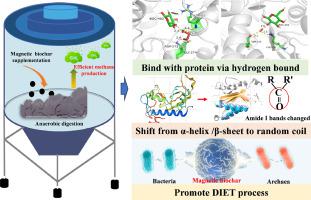当前位置:
X-MOL 学术
›
Water Res.
›
论文详情
Our official English website, www.x-mol.net, welcomes your feedback! (Note: you will need to create a separate account there.)
Comprehensive insights into the impact of magnetic biochar on protein hydrolysis in sludge anaerobic digestion: Protein structures, microbial activities and syntrophic metabolisms
Water Research ( IF 11.4 ) Pub Date : 2024-06-20 , DOI: 10.1016/j.watres.2024.121963 Likui Feng , Huizhi Mu , Zhelu Gao , Tianyi Hu , Shufei He , Yu Liu , Shijie You , Qingliang Zhao , Liangliang Wei
Water Research ( IF 11.4 ) Pub Date : 2024-06-20 , DOI: 10.1016/j.watres.2024.121963 Likui Feng , Huizhi Mu , Zhelu Gao , Tianyi Hu , Shufei He , Yu Liu , Shijie You , Qingliang Zhao , Liangliang Wei

|
The addition of composite conductive materials is being increasingly recognized as a promising strategy to enhance anaerobic digestion (AD) performance. However, the influence of these materials on protein hydrolysis has been poorly documented. Here, a novel magnetic biochar derived from oil sludge and straw was synthesized using different iron sources and successfully applied in sludge AD. Experimental results revealed that magnetic biochar modified by Fe exhibited excellent electron transfer capacity, moderate magnetization, diverse functional groups (e.g. C=O, C-O=O-), and abundant iron distribution. These characteristics significantly enhanced the hydrolysis of tryptophan-like components, leading to increased methane production (144.44 mL gVS 79.72 mL gVS in the control test). Molecular docking analysis revealed that the binding of magnetic biochar related Fe and Fe, onto sludge proteins via hydrogen bond played a key role in promoting subsequent protein hydrolysis. Additionally, the noteworthy conservation of protein structures from α-helix and β-sheet to random coil, along with the breakdown of the amide I-associated C=O group and amide III-related CN and NH bonds following the addition of magnetic biochar, accelerated the degradation of sludge protein. Observation of variations in protease activity, coenzyme F420, electron transfer system (ETS), and conductivity within the AD systems, particularly the enrichment of and archaea as well as the and bacteria, suggested that magnetic biochar facilitated a conducive environment by improving hydrolysis-acidification and the direct interspecies electron transfer (DIET) process for acetoclastic methanogens. Moreover, metabolic pathways further proved that tryptophan metobalism and acetoclastic methanogenesis were both facilitated by magnetic biochar. This study provides an in-depth understanding of the impact of magnetic biochar on protein hydrolysis in sewage sludge AD.
中文翻译:

全面了解磁性生物炭对污泥厌氧消化中蛋白质水解的影响:蛋白质结构、微生物活性和互养代谢
添加复合导电材料越来越被认为是增强厌氧消化(AD)性能的有前途的策略。然而,这些材料对蛋白质水解的影响却鲜有记录。本文利用不同的铁源合成了一种源自油污泥和秸秆的新型磁性生物炭,并成功应用于污泥 AD。实验结果表明,Fe改性的磁性生物炭具有优异的电子传递能力、适度的磁化强度、丰富的官能团(如C=O、C-O=O-)和丰富的铁分布。这些特性显着增强了类色氨酸成分的水解,导致甲烷产量增加(对照测试中为 144.44 mL gVS 79.72 mL gVS)。分子对接分析表明,磁性生物炭相关的Fe和Fe通过氢键与污泥蛋白质结合,在促进后续蛋白质水解中发挥了关键作用。此外,在添加磁性生物炭后,从 α 螺旋和 β 折叠到无规卷曲的蛋白质结构的显着保守性,以及酰胺 I 相关的 C=O 基团和酰胺 III 相关的 CN 和 NH 键的分解,加速了污泥蛋白质的降解。对 AD 系统内蛋白酶活性、辅酶 F420、电子转移系统 (ETS) 和电导率变化的观察,特别是古细菌和细菌的富集,表明磁性生物炭通过改善水解酸化来促进有利的环境以及乙酰分解产甲烷菌的直接种间电子转移(DIET)过程。 此外,代谢途径进一步证明磁性生物炭促进了色氨酸代谢和乙酰分解产甲烷作用。这项研究深入了解了磁性生物炭对污水污泥 AD 中蛋白质水解的影响。
更新日期:2024-06-20
中文翻译:

全面了解磁性生物炭对污泥厌氧消化中蛋白质水解的影响:蛋白质结构、微生物活性和互养代谢
添加复合导电材料越来越被认为是增强厌氧消化(AD)性能的有前途的策略。然而,这些材料对蛋白质水解的影响却鲜有记录。本文利用不同的铁源合成了一种源自油污泥和秸秆的新型磁性生物炭,并成功应用于污泥 AD。实验结果表明,Fe改性的磁性生物炭具有优异的电子传递能力、适度的磁化强度、丰富的官能团(如C=O、C-O=O-)和丰富的铁分布。这些特性显着增强了类色氨酸成分的水解,导致甲烷产量增加(对照测试中为 144.44 mL gVS 79.72 mL gVS)。分子对接分析表明,磁性生物炭相关的Fe和Fe通过氢键与污泥蛋白质结合,在促进后续蛋白质水解中发挥了关键作用。此外,在添加磁性生物炭后,从 α 螺旋和 β 折叠到无规卷曲的蛋白质结构的显着保守性,以及酰胺 I 相关的 C=O 基团和酰胺 III 相关的 CN 和 NH 键的分解,加速了污泥蛋白质的降解。对 AD 系统内蛋白酶活性、辅酶 F420、电子转移系统 (ETS) 和电导率变化的观察,特别是古细菌和细菌的富集,表明磁性生物炭通过改善水解酸化来促进有利的环境以及乙酰分解产甲烷菌的直接种间电子转移(DIET)过程。 此外,代谢途径进一步证明磁性生物炭促进了色氨酸代谢和乙酰分解产甲烷作用。这项研究深入了解了磁性生物炭对污水污泥 AD 中蛋白质水解的影响。











































 京公网安备 11010802027423号
京公网安备 11010802027423号